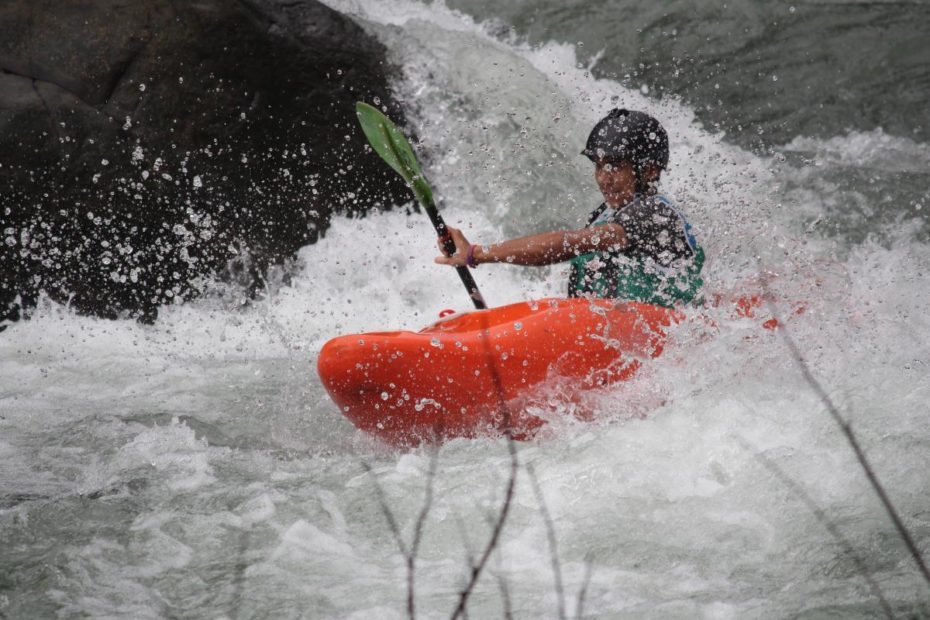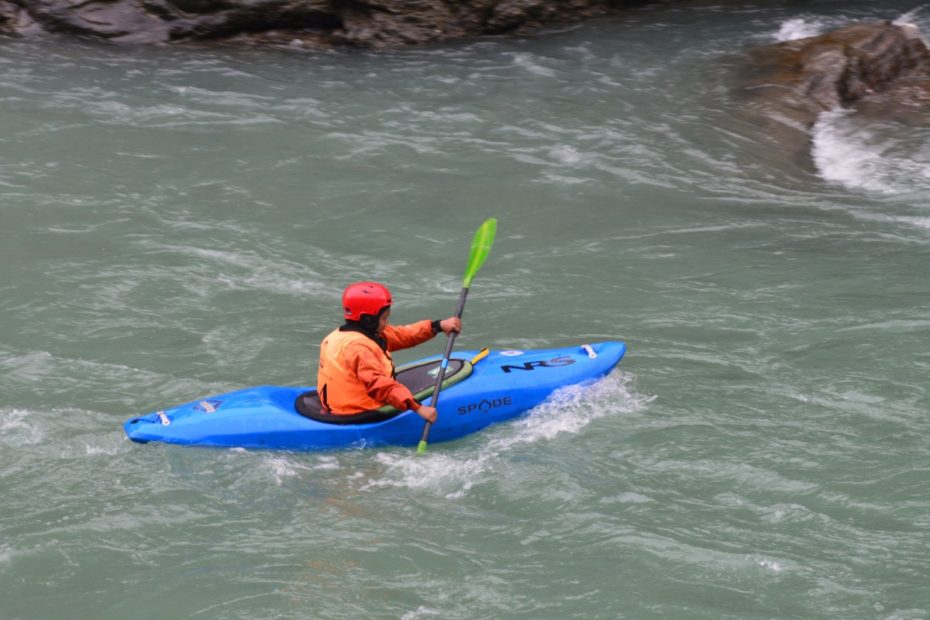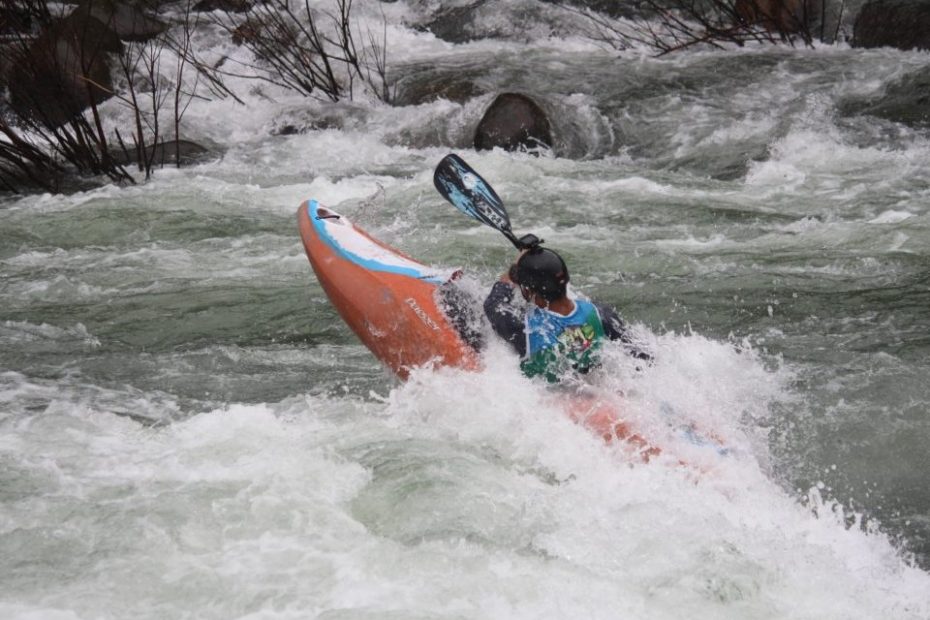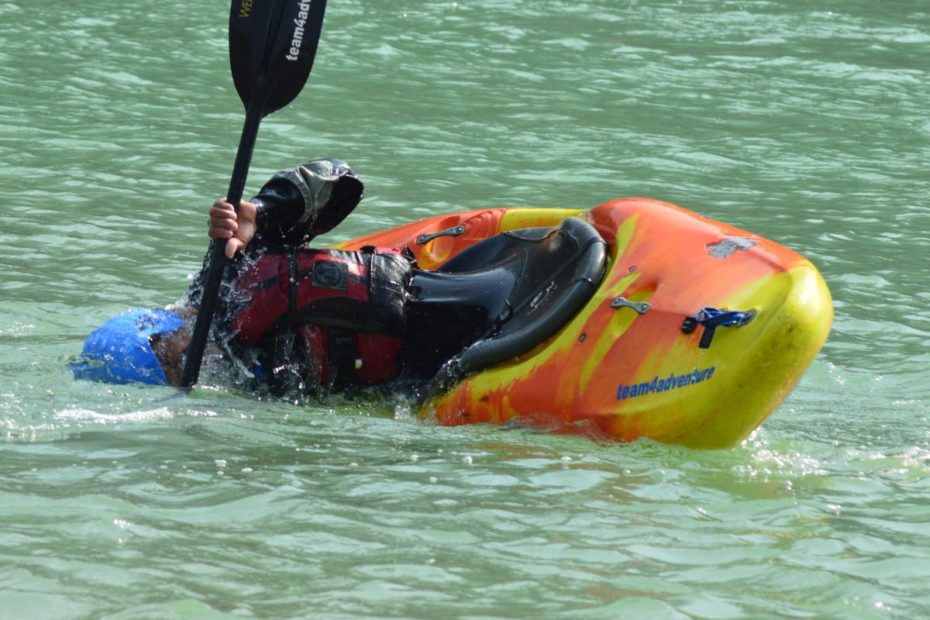Whitewater kayaking is an adventure activity which is now being taken up by an increasing number of participants who hail from a wide spectrum of backgrounds. In the recent past there has been a spurt of interest for this exciting adventure. It is still a nascent sport in terms of infrastructure and availability, and there are only a handful of operators who offer whitewater kayaking as their regular product. If you would like to learn to kayak, then this article may provide lot of insight about the this sport.
Why should you consider whitewater kayaking ?
It is cool. It is one of the most thrilling adventure experiences. It is not a joy ride, so you won’t see just about anyone doing it. Whitewater kayaking offers the satisfaction of developing and using skills to negotiate thrilling rapids on the river. There is excitement, fear, thrill and at the end the high of jubilation of having attempted something which needs skill, courage and an adventurous mindset.
Whitewater kayaking renders you with great thrill that far supersedes that of rafting. One can get their fill of excitement during short weekends or longer trips that enable to be with nature and its simple pleasures.
Whitewater kayaking enables one to explore and visit natural places. It teaches to appreciate and respect the environment. One starts to experience the meaning of “Living in the moment” and would gradually train the mind to stay calm and collected despite of how stressful a situation might be. The takeaway from the sport is huge and changes the perspective of an individual and how they look at life in general.
This article tries to explain this activity and demolish any myths around it.
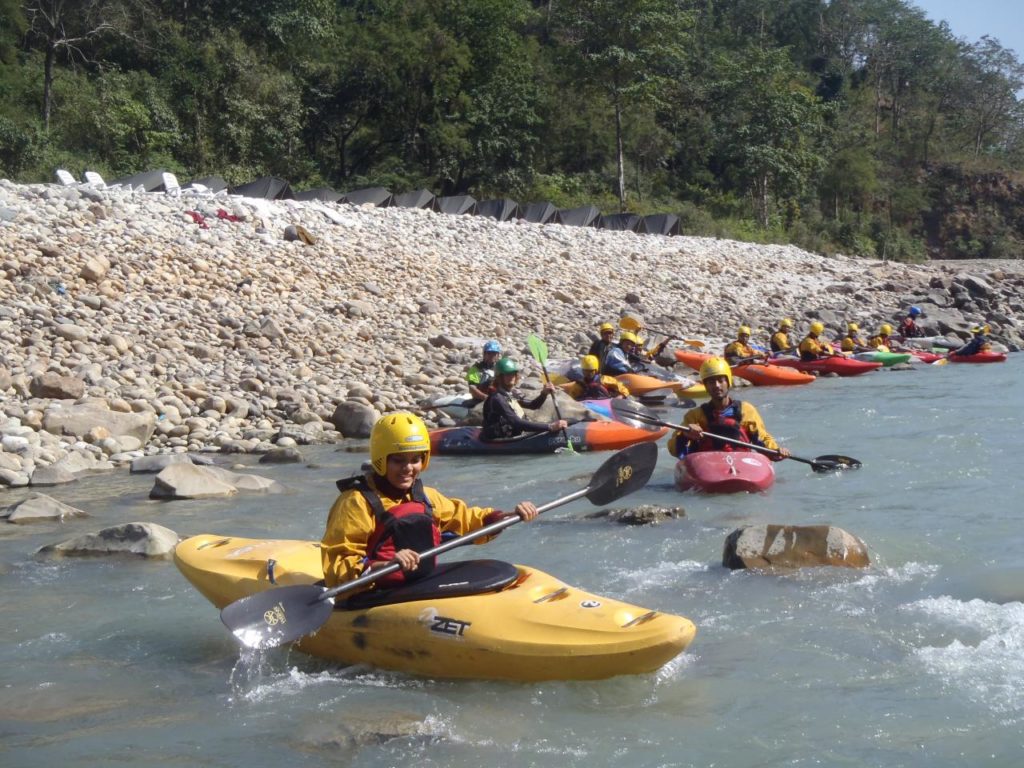
Are there any pre-requisites for whitewater kayaking ?
Whitewater kayaking is not an activity that requires a lot of strength or stamina. Although the presence of either will be a definite advantage.
It is more about being one with the water and understanding the river dynamics deeply. Whitewater kayaking is an activity that primarily requires some physical flexibility, and mental strength to maintain quick, clear decisions and not give up to fear when challenged, in difficult situations.
To experience whitewater kayaking, swimming is not a pre-requisite although it is a definite advantage. As the kayaking experience would grow, the adrenaline rush, the feeling of accomplishment and the need to do more would induce you to learn swimming skills as well.
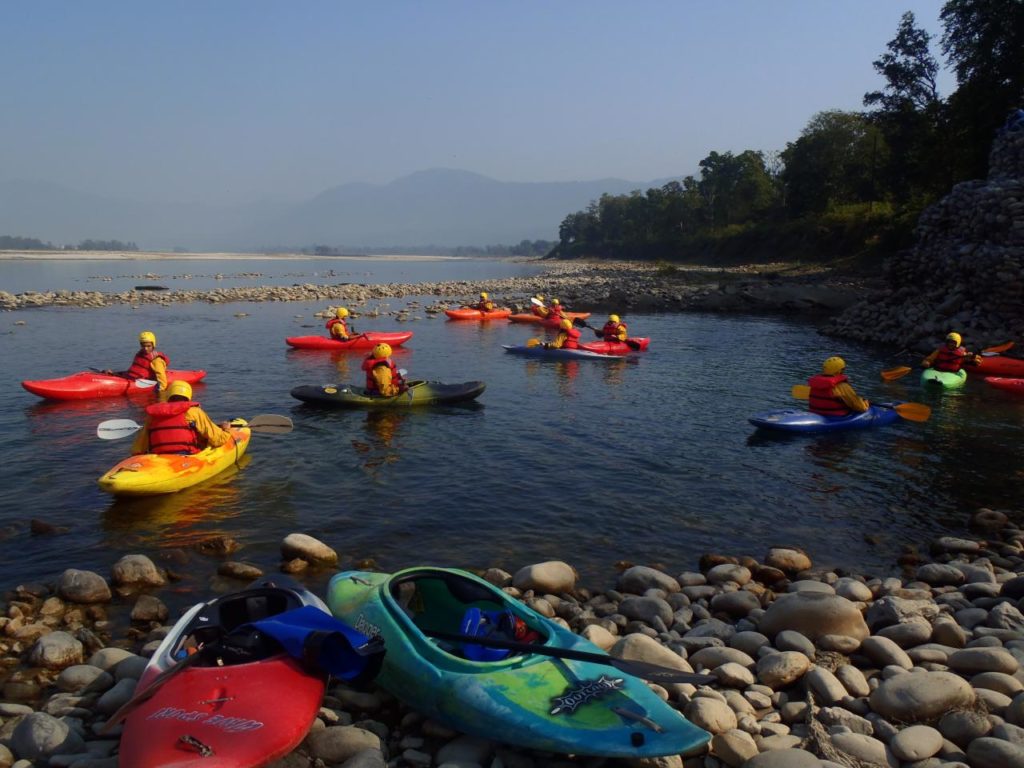
What are the risks of whitewater kayaking ?
To an ordinary observer, Kayaking in whitewater may seem like a very risky and daunting affair. This however is a perceived risk and not an actual one (at least till a reasonable difficulty level). All the basic skills are taught in safe waters and under professional supervision. As one picks up the skills and develops confidence, only then river runs of higher difficulty level are taken up. The assessment of the difficulty level as compared to one’s skills is an integral part of the learning process. Moreover if one has picked the right team to learn kayaking from, there is hardly any risk to it.
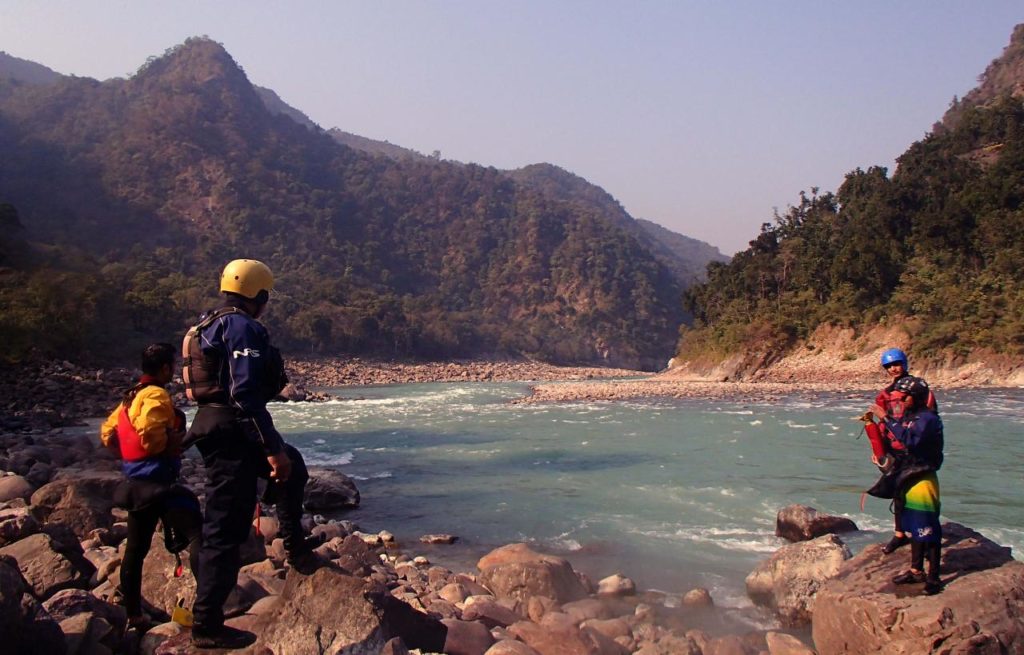
This is not a tick on a checklist of adventures !
This is not an activity which you can treat as a tick mark on a list of adventures that may have been on your mind for a while. There is no joy ride here. One has to have a clear intent and willingness to invest the required amount of time, money and energy to go through the paces and pick up the skills that are required. The more skills and experience one gains, the more fun and thrill lies ahead. It is a journey that is everlasting.
Kayaking is a lifestyle activity that is a heady mix of passion, adrenaline and adventure (and at times a bit of narcissism !). One constantly gets the high of building upon skills and styling them over a period of time. The entire journey is a pleasurable one and it is definitely not possible to pack the entire experience into a one off activity that you decided to go for over one weekend.
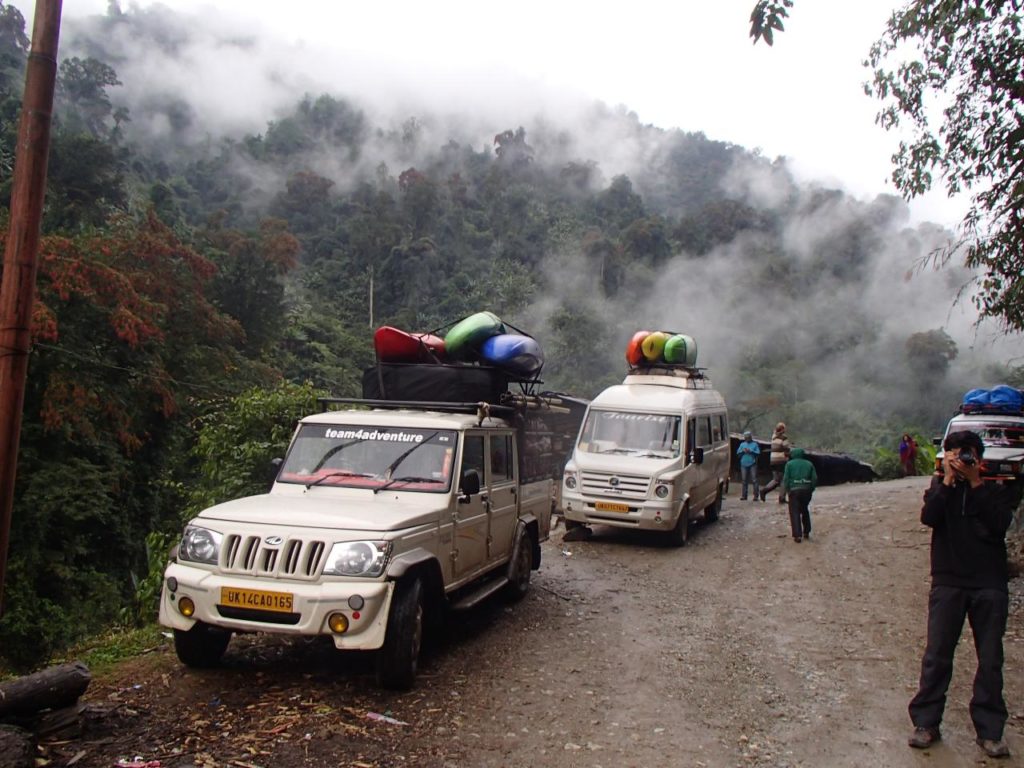
How expensive is whitewater Kayaking ?
Kayaking would require reasonable expenditure, there should be no misconceptions. It is a technical sport and requires high quality and reliable equipment and very good support manpower for instructions as well as safety. Even logistically, the activity is very intensive. Beyond all these factors, most importantly, it isn’t possible to operate kayaking for big groups to share resources and bring costs down. It is an individual sport and for each participant the logistics and support manpower has to scale as well.
A day of kayaking on Ganges would cost anywhere between INR 2500 to INR 4500. These costs would generally include the transportation of boats, participants and river guides for the river run chosen. For expeditions and running other rivers the costs may vary.
Whitewater kayaking milestones – The learning cycle
For someone wanting to take up this sport, the transition from an enthusiast to a skilled kayaker can possibly be in the following sequence:
- Basic skills – 03 to 04 days. These sessions should impart the required training, with lot of river experience. A short session as this would enable the participant to assess themselves personally, and they should be able to make up their mind if they would want to indulge in this sport more deeply or not. Needless to say that these 03 to 04 days would be lot of challenge, excitement and of course fun. You may learn to kayak by taking up the 03 days whitewater kayaking beginners course with TEAM 4 ADVENTURE.
- Eskimo rolling sessions. Once a participant has undergone the basic skills training, they would have got a taste of what this sport is like. They would have also understood the importance of up-righting their boat on their own in case of capsize. Eskimo rolling is a skill that requires some comfort in water and some flexibility in their body.
- Eskimo rolling practice and river running. After one knows how to do eskimo roll, it becomes essential for them to practice and enhance the skill as it may evade you soon without practice. This is very person dependent, and the amount of practice required may vary to a great degree. Of course river runs should be entwined with these sessions so that fun and thrill also gets included along with the learning.
- River running & expeditions. As the experience grows, the participant would love to experience river runs to further enhance their skills as well as to experience greater amount of adrenaline rush. Expeditions are multi-day trips in which one would paddle rivers while camping en-route as they move downstream in their adventure. These are typically done in well-organized teams to ensure safety and to manage the camping and other resources that would be required.
Where can you learn to kayak whitewater in India ?
- TEAM 4 ADVENTURE – Beginners courses, Eskimo rolling workshops, Day trips, Expeditions. Operating kayaking courses since 2003, they have the entire spectrum of products to introduce and nurture whitewater kayaking interest for the enthusiasts.
- Shivanandi River Lodge – Founded by Shalabh Gahlaut, a well respected name in the whitewater kayaking community. The Shivanandi River lodge is situated near Rudraprayag on the Alaknanda river in Uttarakhand.
- Aquaterra Adventures – One of the premier adventure companies, operating a vast variety of adventure activities across the globe.
- Expeditions India – They have a great emphasis on adventures pertaining to rafting and kayaking in India.
- Riverine adventures – Founded and operated by Dinesh Pandey, a well respected name in the whitewater kayaking community. He operates in Rishikesh.
- Goodwave Adventures – They are the pioneers of whitewater kayaking activities in the rivers of South India.
